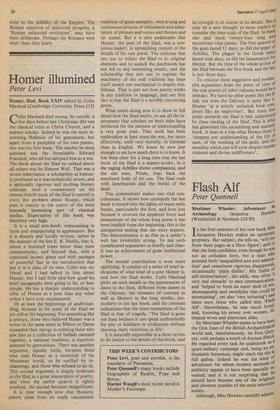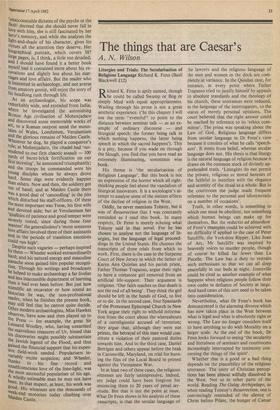Flash Alf
Peter Quennell
Mortimer Wheeler: Adventurer to Archaeology Jacquetta Hawkes (Weidenfeld & Nicolson £10.95)
In the first sentence of her new book ivliss. Jacquetta Hawkes makes an optimistic prophecy. Her subject, she tells us, 'will rise from these pages as a Hero figure'; and of that she feels confident, even though he was not an orthodox hero, but a man wit° aroused both 'unqualified awe and admira- tion' and sometimes vigorous disapproval, occasionally 'plain dislike'. His 'habit of , self-dramatisation', she adds, was often 3 very real obstacle' to easy communicatio!1, and 'helped to form an outer shell of vat' showmanship and swordplay that could bc, entertaining', yet also 'very irritating'; there were those who called him 'Flash Alf'. Nevertheless, he was much loved, and, knowing his power over women, ill- treated wives and mistresses alike.
Sir Mortimer Wheeler seems to have been the Don Juan of the British Archaeological world and, simultaneously, its Don Quix- ote, with perhaps a touch of Ancient Pistol. He regarded every task he undertook as a quasi-military campaign and, being an en- thusiastic horseman, might reach the site at full gallop. Indeed he was the kind of adventurer for whom modern methods .of publicity appear to have been specially 10' vented; and it is not surprising that he should have become one of the brightest and cleverest pundits of the early television screen.
Although, Miss Hawkes candidly admits,
`unaccountable dictates of the psyche or the flesh' decreed that she should never fall in love with him, she is still fascinated by her hero's memory, and while she analyses the light-and-shade of his character, gives his virtues all the attention they deserve. Her biographical portrait, which covers 387 large pages, is, I think, a little too detailed; and I should have found it a better book myself had it contained more about his ex- cavations and slightly less about his mar- riages and love affairs. But the reader who is interested in archaeology, and not averse from amatory gossip, will enjoy the story of his headlong rush through life. As an archaeologist, his scope was remarkably wide, and extended from India, where he investigated the astonishing Bronze Age civilisation of Mohenjadaro and discovered some memorable works of art, to a Roman outpost amid the moun- tains of Wales, Londinium, Verulamium and the glorious remains of Maiden Castle. Wherever he dug, he played a conqueror's role; at Mohenjadaro, the citadel had 'sur- rendered to our first chaotic assault — 100 Yards of burnt-brick fortification on our first morning', he announced triumphantly; and the troops he commanded were his ,Young disciples whom he always drove hard. Some digs were evidently happier than others. Now and then, the soldiery got out of hand; and at Maiden Castle there Was a good deal of 'canoodling' in the pits Which disturbed his staff-officers. Of these the most important was Tessa, his first wife and devoted aide; but at Verulamium her qualities of patience and good temper were severely tested, since during those four seasons' the generalissimo's 'more sensuous love affairs involved three of their assistants and in the periods of transition emotions could run high'. Despite such vagaries — perhaps inspired by them — Wheeler worked extraordinarily hard; and, his natural energy and masculine Panache soon gained him popular recogni- tion. Through his writings and broadcasts he helped to make archaeology a far livelier and less inaccessible department of learning than it had ever been before. But just how scientific an excavator or how sound an historian he was, the non-professional reader, when he finishes the present book, may still feel that he cannot quite decide. Other modern archaeologists, Miss Hawkes observes, have now and then played up to the Press — for example, the great Sir Leonard Woolley, who, having unearthed the marvellous treasures of Ur, hinted that his discoveries might possibly substantiate the Jewish legend of the Flood, and thus gained the financial support that his expen- sive field-work needed. Popularisers in- variably excite suspicion; and Wheeler, thanks to his fine record and unselfconscious love of the lime-light, was the most successful populariser of his age. rA wholly estimable man he may not have been. In that respect, at least, his work was good. His witnesses are the thousands of Week-end motorists today climbing over Maiden Castle.



































 Previous page
Previous page